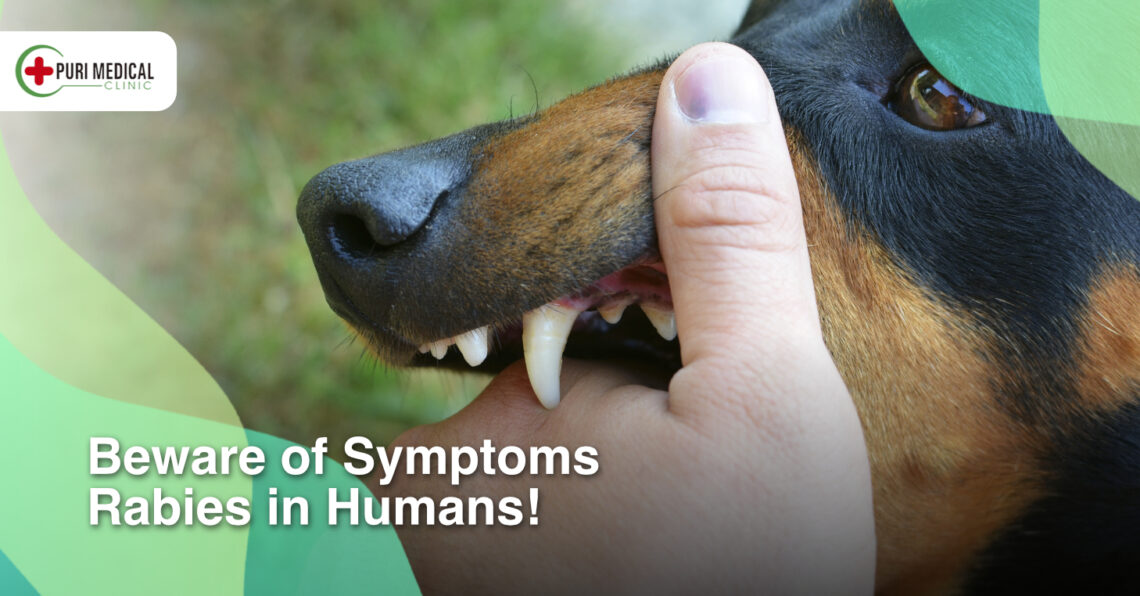
Rabies is a viral disease that affects the central nervous system of mammals, including humans. It is transmitted through the saliva of infected animals, most commonly through a bite. This article will provide an in-depth look at what rabies is, the symptoms of rabies in humans, how the symptoms can be transmitted to humans, first aid and treatment for rabies, and the importance of the rabies vaccine.
What are Rabies?
Rabies is caused by the rabies virus, which belongs to the Rhabdoviridae family. It primarily affects warm-blooded animals, including dogs, cats, bats, and raccoons. The virus attacks the central nervous system, leading to inflammation in the brain and eventually causing severe neurological symptoms. Rabies is almost always fatal once symptoms appear, making early recognition and treatment critical.
Symptoms Rabies in Humans
The incubation period of rabies can range from weeks to months, with an average duration of 1 to 3 months. Throughout this period, individuals may not show any symptoms. However, once the virus reaches the brain and central nervous system, the initial symptoms listed below may manifest:
- Fever and headache: During the early stage of rabies infection, individuals may experience flu-like symptoms, including mild fever and headache.
- Pain or tingling at the site of the bite: If someone has been bitten by an animal suspected of having rabies, feeling pain or tingling at the location of the bite serves as a significant warning sign.
- Neurological Symptoms: As the infection progresses, rabies affects the nervous system, leading to a variety of neurological symptoms:
- Agitation and anxiety: Infected individuals may display signs of restlessness, anxiety, or irritability.
- Confusion and hallucinations: Rabies can cause confusion, disorientation, and even hallucinations, which can impede effective communication.
- Hydrophobia: Hydrophobia, an intense fear of water, is one of the classic symptoms of rabies. The mere thought or sound of water may trigger throat muscle spasms, making it difficult for the person to swallow.
- Hyperactivity and aggressive behavior: Some individuals may become hyperactive, exhibit aggressive behavior, and have uncontrolled outbursts, often without any provocation.
- Paralysis and difficulty swallowing: As the disease progresses, muscle weakness, paralysis, and difficulty swallowing may develop.
read more article 3 Important Reasons Why You Should Take Rabies Vaccines
Transmission of Rabies Symptoms to Humans
Rabies is primarily transmitted through the bite of an infected animal. The virus is present in the saliva of infected animals and can enter the body through open wounds or mucous membranes. However, it’s important to note that not all animal bites transmit rabies. Other modes of transmission include scratches, licks on broken skin, or contact with mucous membranes. Common carriers of the virus include dogs, cats, bats, and wild animals.
First Aid and Treatment for Rabies
If you are bitten by an animal, it is crucial to take immediate action. The first step is to thoroughly wash the wound with soap and water for at least 15 minutes. This helps to reduce the chance of infection. Afterward, it’s essential to seek medical attention as soon as possible. The healthcare provider will assess the wound and determine the appropriate course of treatment, which typically involves a series of injections to prevent the virus from spreading.
If You Have Been Bitten By a Stray Animal Take Rabies Vaccine Soon
Prevention is the key to combatting rabies. Vaccination plays a crucial role in preventing the spread of the disease. Vaccinating domestic animals, such as dogs and cats, is recommended against rabies. Additionally, individuals who are at high risk of exposure to rabies, such as veterinarians, animal handlers, and travelers to rabies-endemic regions, should consider getting vaccinated. The rabies vaccine is safe and effective, providing immunity against the virus.
Feeling Rabies Symptoms? Come to Puri Medical!
If you suspect you have been exposed to rabies or need further information, we encourage you to visit Puri Medical or contact us at +(62) 85 100 103 103 & email [email protected], a leading healthcare facility specializing in infectious diseases. Our experienced medical team can provide accurate diagnosis, appropriate treatment, and necessary support for individuals potentially affected by rabies. Take the necessary steps to protect your health and seek medical attention promptly.
Remember, rabies is a serious and life-threatening disease, but it can be effectively managed with timely intervention. Your health and well-being are our priority. Visit Puri Medical for professional medical care and guidance.








